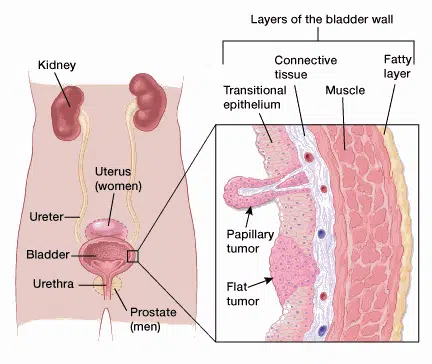Posted: 06/05/2025
Bladder Cancer Awareness Month 2025
Reading Time: 3 minutes
In May 2025 we are spreading awareness of bladder cancer. Bladder Cancer Awareness Month is a campaign led by the World Bladder Cancer Patient Coalition and is the dedicated time to help:
- Raise awareness about bladder cancer, its signs and symptoms.
- Promote education about risk factors, prevention, and early detection.
- Supporting patients, survivors, and caregivers.
- Advocate for more research and better treatment options
Every year, bladder cancer affects over 610,000 people and 1.9 million people are currently living with the condition. It is the 9th most commonly diagnosed cancer and the 13th cause of death from cancer globally. For further information regarding the charity, please click here Bladder Cancer Awareness Month – May 2025
What are the signs of bladder cancer?
The most common signs of bladder cancer, although these can overlap with other conditions such as UTIs, kidney stones or an enlarged prostate (in men), are:
- Blood in the urine (haematuria), often painless and may appear pink, red or brown and sometimes only detected on a urine test
- Frequent urination
- Pain or burning during urination
- Feeling the urgent need to urinate, even if the bladder isn’t full
- Weak urine stream or difficulty urinating
When it is likely that the cancer has spread or is at an advanced stage, symptoms can increase. Advanced Symptoms (when cancer has spread) can include:
Pain in the lower back or pelvis
- Unexplained weight loss
- Fatigue
- Swelling in the legs
- Bone pain (if it has spread to bones)
How to test for bladder cancer?
If you are worried about potential symptoms, your GP can do a quick test to see if there is any blood in your urine. They dip a testing stick into a fresh sample of your urine and then send off your urine to a laboratory for testing. This is to ensure that they have ruled out any other potential causes such as infections.

The GP may also examine inside your back passage or vagina to see if everything feels normal. Depending on the results found by your GP, they will likely refer you across to a urology department to be seen by a urologist.
In order to diagnose bladder cancer and how far this has grown/what stage it is at, you will undergo the following:
- a test to look inside your bladder (cystoscopy)
- tests to look at your kidney, bladder and ureters (CT urogram)
- scans to look at your bladder and the rest of your body (ultrasound, MRI scan, CT scan, PET-CT scan)
To find out more regarding each of the scan, please visit cancer research Tests for bladder cancer | Cancer Research UK
How can you get involved?
There are several ways to help raise awareness and support the bladder cancer awareness month campaign. These are as following:
- Download the BCAM toolkit
- Play and sharing the Spot the Drop game
- Read and sharing infographics, which contains helpful information about bladder cancer
- Sign up for the monthly newsletter and quarterly newsletter
- Share the symptom awareness video
- Follow and sharing BCAM content on social media
- Download and sharing the Unsure Icon
- Explore BCAM 2023 report
If you have suffered misdiagnosis or delay in diagnosis related to bladder cancer and you have a worse prognosis as a result of this, you may have a claim for clinical negligence. At Williamsons, we deal with a large variety of clinical negligence compensation claims including missed/delayed diagnosis of cancer, which can have grave consequences for the patient.
If you feel that you have been the victim of any form of clinical negligence, whether from the NHS or in respect of private treatment, please do not hesitate to contact our Clinical Negligence Department to discuss how we may be able to help.
FRIENDLY, EFFICIENT LEGAL ADVICE
We’re ready to chat when you are
Drop us an email or give us a call for a no obligation chat to see if we can help.